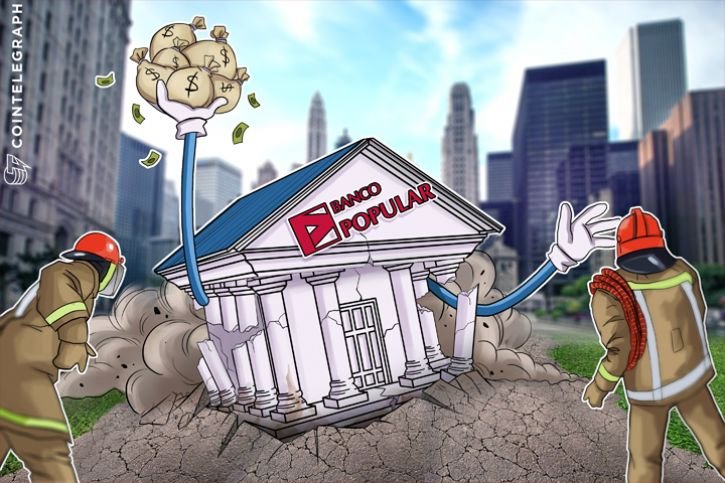
After Greece and Cyprus, the Italian peninsula is sending alarming signals while new European banking rules are likely to constrain state action.
On 25 June, the Italian government formalized the rescue of two medium-sized mutual banks - Banco Popolare di Vicenza and Veneto Banca - on the brink of bankruptcy, after finding no investor in the markets to help them.
Such situations are causing investors all over Europe to question the safety of the banking system. The particular attributes of the unprecedented bailout of Cyprus' banks
in 2013 have led to a significant surge in Bitcoin price, as investors sought safe havens and access to liquidity. We have yet to see how future bank bailouts will impact the alternative financial systems proposed by cryptocurrencies.
The costly rescue of Venetian banks
The Italian state will put €4.785 bln on the table so that Intesa Sanpaolo, the country's first retail bank, takes over the two banks. Pier Carlo Padoan, Minister of Economy, said that the total cost of public guarantees in this transaction could amount up to €17 bln, to cover the deteriorated credits of the two banks.
The rescue of the two banks was carried out by the government, therefore with Italian public funds, and not by a European mechanism. This rescue could allow Italy to settle in its own way this crisis, the latest in an Italian banking sector bending under doubtful debts, which account for one-third of the total in the euro area.
What must be noted from this rescue is that it was impossible to liquidate these two banks without calling on the taxpayer's money. This Italian case also shows the limits of the BRRD (Bank Recovery and Resolution Directive), which is based on the principle that no more penny of public money should make it possible to bail out a poorly managed bank. It is not without regret in the camp of all those who wanted to break the ties between the States and the banks.
Averted bankruptcy for Banco Popular
Santander has bought Banco Popular Espanol SA after its collapse for a symbolic euro. The group guarantees the continuity of the business of Banco Popular without the depositors being affected. This is the first successful bankruptcy test for the European Banking Union.
The announcement ends weeks of suspense, during which the management of the troubled bank sought a solution to solve its liquidity problems. The situation had become unsustainable, while Banco Popular was caught in a stock market spiral that saw its capitalization on the Madrid stock exchange plunged from €2.7 bln to €1.4 bln in a single week.
Popular thus becomes the first bank to be rescued by the new European mechanism aimed at preventing the bank crises contagion of States. While the operation imposes heavy losses on shareholders, it will guarantee the security of deposits and the continuity of commercial activity. “We welcome Banco Popular's customers,” announced Ana Botin, President of the Santander Group, on social media. “We will work to provide them with the best service during this transitional period and in the future.”
On the side of the government which had insisted in recent days on the stability of the Spanish financial sector, the Minister of Economy Luis de Guindos emphasizes that the operation has nothing to do with the rescue of Bankia. In 2012, de Guindos involved the mobilization of €22.4 bln of public funds, causing markets doubts about the solvency of the country.
This time, the minister notes, “the operation takes place without public funds and without any contagion between sovereign and banking risk. The current situation is very different from that of 2012, due to the good health of the entire financial sector and the Spanish economy in general.”
Bank bailouts are back
Despite all of the money spent to improve the situation of troubled banks in the past, countries such as Portugal and Italy are still facing financial instability, as the local economy keeps struggling and further taxpayers injections are required.
Another public bailout is being prepared in Italy, that of Monte Paschi, the fourth Italian bank. The bailout plans to inject €6.6 bln in state aid, which will be officially announced by European Commission shortly.
Hi! I am a robot. I just upvoted you! I found similar content that readers might be interested in:
https://coss.io/news/article/ab964af3-3a15-48ec-841b-d30e2a6ff968
Thanks for your well presented take fleshing out the headlines with more details than were uploaded by the usual crowd on Youtube.
Actions such as these in the EU would be concerning in themselves. Couple those concerns with news that eight states in the USA failed to pass state budgets by 01 July. Those states face government shutdowns of non-essential services this week.
Without wanting to appear alarmist, one must wonder where an economic basket cases like Italy and rust belt states are going to find funds to remain operational.
I keep having visions of the 1930s where people would use a wheelbarrow to cart their paper money to the store for a loaf of bread. Think Venezuela today. Who wants to be sitting on a pile of fiat when the music stops?
Great post leandrolemos 😎. Please Check out some of my Cryptocurrency recommendations!
https://steemit.com/steem/@crypto-expo/cryptocurrency-altcoins-top-20-to-invest-in-2017